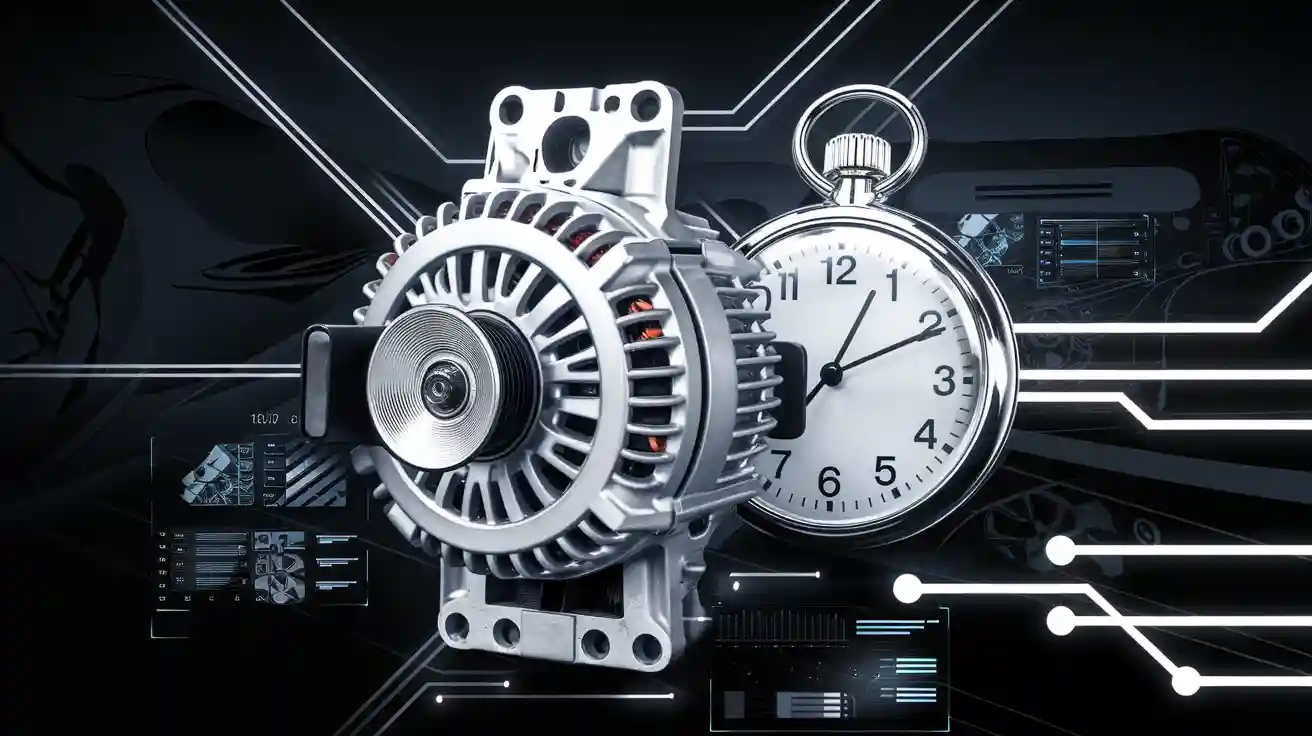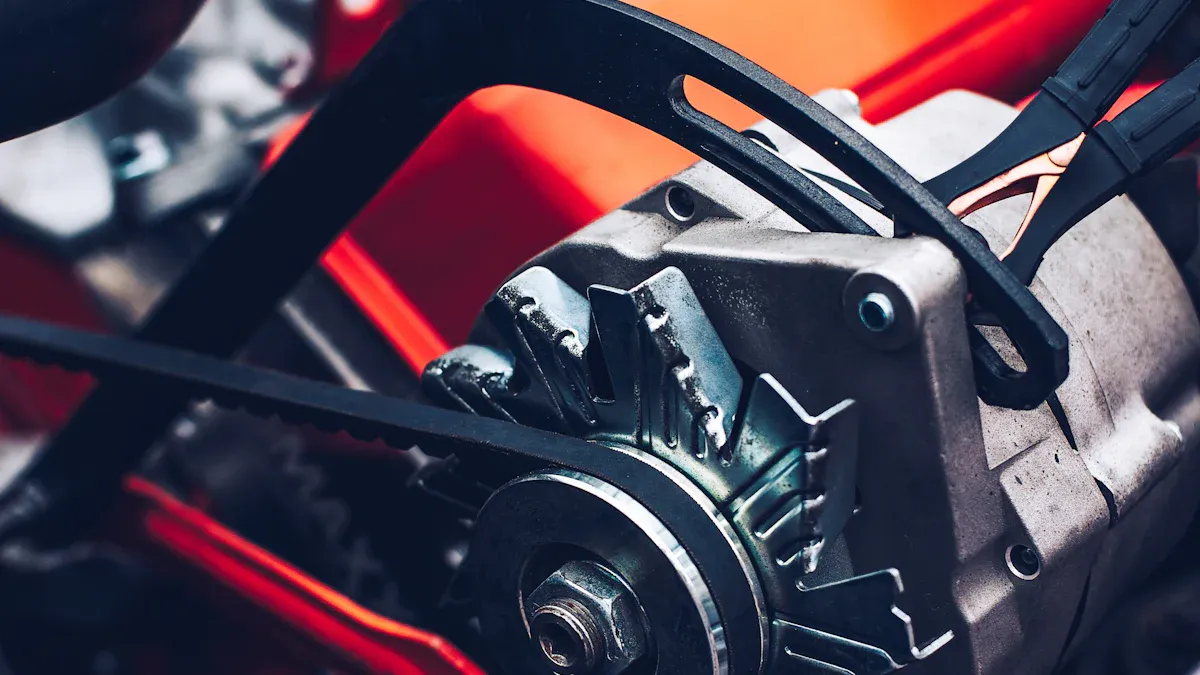
You might wonder how long does an alternator last in your vehicle. Most oem alternators work well for 7 to 10 years or between 80,000 and 150,000 miles. Some even last past 200,000 miles if you take good care of your car. Your habits, how you drive, and how you maintain your vehicle all play a big role. Oem alternators can fail sooner if you ignore regular checks or use many electrical accessories.
Key Takeaways
OEM alternators often last 7 to 10 years or 80,000 to 150,000 miles if you take care of them. Regular maintenance like checking belts, cleaning connections, and testing voltage helps your alternator last longer. Look for warning signs like dashboard lights, dim headlights, strange noises, or burning smells to find problems early. Using many electrical accessories at the same time makes the alternator work harder and can make it wear out faster. Picking good OEM parts and watching how much electricity your car uses can save money and stop expensive repairs.
OEM Alternators Lifespan

Image Source: unsplash
How Long Does an Alternator Last
You might wonder how long an alternator lasts in real life. Most oem alternators work for 7 to 10 years. They usually last between 80,000 and 150,000 miles. Some people say their oem alternators lasted even longer. If you take care of your car, it could reach 200,000 miles or more.
Many drivers talk about their experiences online. Some say their alternators lasted over 100,000 miles. Others got close to 250,000 miles before changing them. One person had a 3rd Gen alternator still working at 249,000 miles because they did regular maintenance. Another driver planned to replace theirs at 175,000 miles, but it was still working at 161,000 miles. These stories show oem alternators can last a long time if you care for your car.
Older alternators did not last as long as new ones. They often needed to be replaced after only 40,000 to 60,000 miles. Modern oem alternators are better. They last longer and work for more miles. The average alternator lifespan is higher now because of better design and materials.
Most car makers give a warranty for oem alternators. You usually get coverage for 12 to 24 months. Some warranties cover a certain number of miles.
As a reliable China alternator company, Elecdura products are backed by an 18-month warranty from the shipping date, covering manufacturing defects and functional failures under normal use. This helps you feel better if your alternator stops working early. Contact us today to experience industry-leading alternator performance and service.
What Affects Lifespan
You can help your oem alternator last longer by knowing what affects its life. Here are some important things:
Maintenance: Regular checks and fixing problems keep your alternator working. Clean battery ends and tight belts help stop early problems.
Driving Habits: Short trips and stopping a lot make your alternator work harder. Long drives on highways are easier for it.
Electrical Load: Using lots of things like heated seats, lights, and music puts more work on your alternator.
Climate: Very hot or cold weather can make alternators wear out faster. Some people say their alternators lasted over 8 years and 117,000 miles even in tough weather.
Quality of Parts: Oem alternators usually last longer than other kinds. They use better materials and fit your car well.
There are not many official studies on how long an alternator lasts. Most facts come from drivers sharing their stories. Some articles tell you how to test alternators, but they do not give exact numbers for how long they last.
Tip: Keep your car's electrical system in good shape. This helps your oem alternator last as long as it can.
Signs of Failure

Image Source: pexels
Warning Lights
Always look at your dashboard when you drive. The battery or charging system warning light is an early sign of trouble. This light might look like a battery or show "ALT" or "GEN." If you see this light, your car may not be charging right. Sometimes, the warning light does not turn on even if the alternator is bad.
Complaint | Cause | Correction | Insight on Alternator Warning Light Accuracy and Effectiveness | |
|---|---|---|---|---|
The Two Minute Alternator Repair | Battery dead after sitting over weekend | Alternator not charging due to rusty electrical connector | Cleaning connector restored charging system | Alternator warning light did NOT illuminate despite charging fault, showing limitation in warning light accuracy |
The Start/Stall/Start/Stall Problem | Engine stalls immediately after starting | Alternator overcharging causing PCM shutdown | Replacing alternator fixed stalling | Highlights alternator faults affecting vehicle systems; warning light behavior not always clear |
The Speedometer Works as if It Is a Tachometer | Speedometer needle fluctuates with engine speed | Alternator producing excessive AC voltage due to bad diode | Replacing alternator restored speedometer function | Demonstrates alternator faults affecting vehicle electronics; warning light behavior not detailed |
Note: Studies show drivers sometimes miss or do not understand warning lights. Always check your owner's manual to know what each light means.
Electrical Issues
You can spot electrical issues before your car stalls. The above are typical symptoms of a bad alternator. Your headlights may dim or flicker. It seems like radio itself just disappeared.” Power windows and seats might be sluggish. At times the voltage goes down to under 13v when the vehicle is at rest. If you turn on the heater or headlamps and the voltage falls to 12V, the alternator is not carrying the load.
Electrical issues, according to diagnostic guides, are problematic because of their numerous deceitful causes. A poor connection or a fault with the powertrain control module can illuminate warning lights, despite no problem with the battery. Checking at the alternator terminal with a multimeter can help you determine the actual cause of the problem.
Tip: See if turning off the radio or other device eliminates the problem. This may help you determine if the alternator is the problem.
Noises and Smells
Strange noises or smells could indicate a dying alternator. You may hear squeaking or grinding coming from the engine. Burning smell: The alternator may be overheating or the belt may be slipping. Sometimes these need replacing before your alternator goes bad.
Burning smells and squeaking are typical alarm signals.
These issues are frequently connected to power problems.
It is possible to catch these problems early with periodic checks.
If you spot any of the following signs, have your car checked in the near future. Nipping problems in the bud makes it possible to prevent things getting worse later.
Extend Alternator Lifespan
Maintenance Tips
A few simple things can help make your alternator last longer. Maintaining it means your car’s charging system is in good working order, and prevents early failure. Here are a few things that many car guides and experts advise:
1.Check the drive belt often. Check it for cracks, or if it’s loose. Replace or adjust the belt if needed.
2.Find all the electrical connections. Check to see that they are tight, and not rusted. Clean them if they are dirty or rusty.
3.Test the voltage of the alternator with a multimeter. With the car running, it should read 13.8 to 14.2 volts.
4.Clean away dirt and grease on the alternator. It will get too hot and can break.
5.If the voltage is low, test the brushes and the voltage regulator. If still no power, check the rotor, stator, and rectifier.
Tip: Inspect and clean the alternator's cooling holes and the wires every 1,000 to 1,500 miles. This prevents rust and keeps the alternator cool.
You also want to test your cables and connections for voltage drop, once a year. The voltage should not drop more than half of a volt. Steaming the alternator removes dirt, salt and oil and can return motors back to like-new condition - especially if you go 4x4 off-roading.
Managing Electrical Load
Taking care of how much electricity you use helps your alternator last longer. Using too many things at once makes it work harder. Try these ideas:
Turn off heated seats, back window heaters, and extra lights when you do not need them.
Do not play music very loud for a long time.
If you add new gadgets, make sure your alternator can handle them.
When you get a new alternator, pick OEM-quality or rebuilt ones with the right power. If your car has lots of electronics or starts and stops a lot, think about getting a bigger alternator. This helps your battery and makes the alternator last longer.
Doing regular checks and using your car's electronics wisely can help you save money and keep your alternator working for a long time.
You can expect most OEM alternators to last 7 to 10 years if you care for your car. Many factors affect lifespan, including how you drive and how much you use your car's electronics. Regular maintenance and early detection of problems help you avoid costly repairs.
Watch for dashboard warnings or flickering lights.
Listen for odd noises or burning smells.
Schedule routine checks with a trusted technician.
Routine service keeps your alternator and battery healthy, saving you money and stress in the long run.
FAQ
How do you know if your alternator is failing?
You may see a warning light, hear strange noises, or notice dim lights. Your car might have trouble starting. If you spot these signs, get your alternator checked soon.
Should you replace the alternator or repair it?
Most people replace the alternator. Repairs can work for small issues, like a loose belt. If the alternator is old or damaged, a new one is a better choice.
Does using electronics shorten alternator life?
Yes, using many electronics at once makes your alternator work harder. Try to turn off things like heated seats or extra lights when you do not need them.
How much does a new OEM alternator cost?
A new OEM alternator usually costs $300 to $700. Labor adds more. Prices change based on your car's make and model. Always ask your mechanic for a full estimate.





